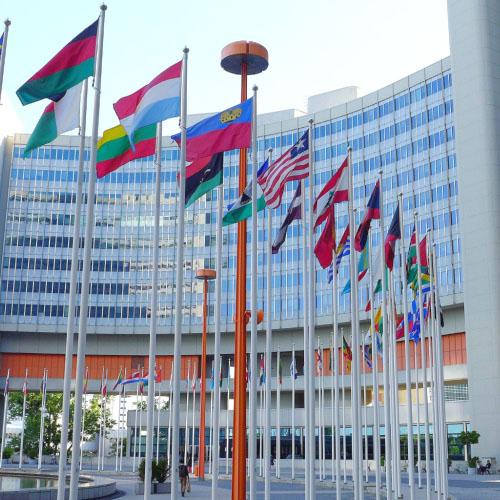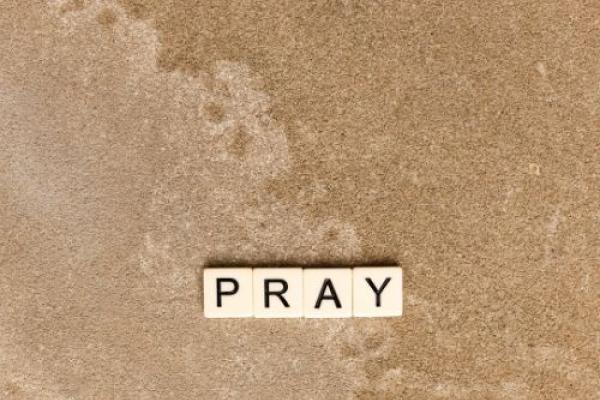“LORD, how many are my foes! How many rise up against me!
Many are saying of me, ‘God will not deliver him.’
But you, LORD, are a shield around me, my glory,
the One who lifts my head high.”
(Psalm 3:1-3 NIV)
I'm sure you'll agree that last year didn't have many high points. However, one of them that I would regard as truly miraculous was the Abraham Accords. After 70 years of hostility toward Israel, Muslim nations like the United Arab Emirates and Saudi Arabia suddenly opened themselves to the idea of peaceful cooperation.
Over the last year we have seen diplomatic ties strengthened, technological and cultural exchanges, and talk of real peace among more and more nations. It’s a prayer I have prayed for a long time. If you’re reading this, then you have probably been praying the same prayer.
While I am more hopeful than even that there might be peace, we must not cease to pray. Israel still has many enemies that want to destroy her and the Jewish people.
Chief among those enemies is Iran. As you’ll see below, the country’s leadership is doing all they can to be in the news and to pressure newly inaugurated U.S. President Joe Biden.
Please read through the news stories included and continue to pray for our Lord to be a shield around Israel and the Jewish people. Thank you.
Iran Violating Nuclear Agreement in Effort to Pressure Biden to Re-Enter Deal and End Sanctions
Iran announced that it will take steps toward producing uranium metal. This is a direct violation of the 2015 Joint Comprehensive Plan of Action (JCPOA) nuclear agreement.
This news came just days after Tehran resumed enriching uranium to 20% purity. The JCPOA says Iran can enrich uranium only up to 3.67% until 2030.
Decision makers in Israel and the six world powers known as the P5+1 have taken notice of these deliberate breaches of the agreement.
“The production of uranium metal has potentially grave military implications,” said the foreign ministers of Britain, France and Germany, the so-called E3, in a joint statement, The Times of Israel reported.
These moves are seen as an attempt to pressure the Biden administration to move forward quickly with re-entering the JCPOA agreement and end the sanctions former-President Donald Trump put in place in 2018 when he withdrew the U.S. from the nuclear agreement.
Jeffrey Lewis, nonproliferation scholar at the Middlebury Institute of International Studies, believes that in addition to trying to gain leverage in future talks with the Biden administration, Tehran is also trying to make as much progress as possible in its nuclear program before the U.S. re-enters the agreement.
U.S. President Joe Biden promised to re-enter the JCPOA while he was campaigning. In September, he wrote, “If Iran returns to strict compliance with the nuclear deal, the United States would rejoin the agreement as a starting point for follow-on negotiations.”
Israeli Official Issues Strong Statements Concerning Iran
Last week, ministers from the Likud political party said the new U.S. administration must not “appease” Iran and warned Tehran that Israel will not tolerate its military presence in Syria or its development of nuclear weapons.
In one of the most forceful statements made by an Israeli official, the Likud’s Tzachi Hanegbi, considered an ally of Prime Minister Benjamin Netanyahu, spoke out against Iran. He stated Israel could attack Iran’s nuclear program if the United States rejoins the JCPOA nuclear deal, as U.S. President Joe Biden has said he plans to do.
“If the United States government rejoins the nuclear deal – and that seems to be the stated policy as of now – the practical result will be that Israel will again be alone against Iran, which by the end of the deal will have received a green light from the world, including the United States, to continue with its nuclear weapons program,” Hanegbi said in an interview with Israel’s Kan news.
“This of course we will not allow. We’ve already twice done what needed to be done, in 1981 against the Iraqi nuclear program and in 2007 against the Syrian nuclear program,” he said, referring to airstrikes on those two countries’ nuclear reactors.
“The most important thing is to convince the new American administration not to repeat the mistakes of the Obama administration – to appease the Iranians. This only increased Iranian aggression and defiance. They saw this as American weakness,” said Hanegbi.
Alleged Israeli Airstrikes Targeted Iranian Weapons Near Syria-Iraq Border
Airstrikes in the pre-dawn hours of January 13, allegedly carried out by Israel, were aimed at dozens of warehouses and sites belonging to pro-Iranian militias and the Iranian Revolutionary Guards Corps (IRGC) in eastern Syria and near the Syria-Iraq border. This is according to local news source Deir EzZor 24 in Syria.
The strikes were reported by regional media as some of the largest and most intense in eastern Syria in recent years. A number of buildings had been completely destroyed, based on images from the site, according to The Jerusalem Post.
An American intelligence source told The Associated Press the strikes were based on intelligence provided by the U.S.
These airstrikes hit “advanced weaponry and weapons depots… in a large combat arena,” a regional intelligence source said.
A U.S. official said the strikes hit a series of warehouses near the Iraqi border that were being used in a pipeline to store and stage Iranian weapons. Syrian media outlets reported that the targets were missiles that had been brought into the country in recent weeks, The Times of Israel reported.
Amos Yadlin, the director of Tel Aviv University’s Institute for National Security Studies tweeted that the strikes served as a reminder to Iran that Israel will not stop fighting to stop Iranian activity in Syria, even during the Biden administration.
He added that they also served to remind Syrians that “there is a heavy price for the free hand you give to the Iranians in Syria,” and to remind the incoming Biden administration that the challenge from Iran includes conventional military threats, not just the nuclear issue.
Independent reports on the number of casualties ranged between 25 and 30. Syrian state media and Iranian media had not reported on casualties, but large numbers of ambulances were reported in the area soon after the strikes.
The Israel Defense Forces had no comment on the late-night strikes, which is according to its policy to neither confirm nor deny its operations in Syria, except for those in retaliation for an attack from the country.
Iran Holds Multiple Military Drills With Ballistic Missiles and Bomb-Carrying Drones
Last Friday, Iran’s Islamic Revolutionary Guard Corps (IRGC) held a military exercise involving ballistic missiles and drones in the country’s central desert, state TV reported. This is amid heightened tensions over Tehran’s nuclear program.
In the first phase of the drill, the IRGC’s aerospace division launched several surface-to-surface ballistic missiles against simulated enemy bases, state TV reported. Bomb-carrying drones were also deployed.
The missile capability of Iran is up to 2,000 kilometers (1,250 miles) – far enough to reach Israel and U.S. military bases in the region. Last January, after the U.S. killed a top Iranian general in Baghdad, Tehran fired ballistic missiles at two Iraqi bases housing U.S troops in retaliation. The result was brain concussion injuries to dozens of troops.
In recent weeks, Iran has increased its military drills. Last week, Iran’s navy held a two-day short-range missile drill in the Gulf of Oman. A week earlier, Iran held a massive drone maneuver across half the country.
The IRGC is designated as a terrorist organization by the U.S.
While worrying, Iran’s military muscle flexing may have a positive side effect. Surrounding nations see Israel and her formidable military as the best counter to Iranian domination. This may increase the cooperation, and possibility for real peace, that has already begun between these nations and Israel.
Let Us Pray Together
Please pray with me for:
- Protection for Israel against Iran and other enemies, especially throughout the coming weeks as tensions are high
- Peace in America, Israel and across our world during this time of ongoing challenges and transition of leadership in the U.S.
- Wisdom for world leaders concerning Iran and the JCPOA nuclear agreement
- Continued success in rolling out the coronavirus vaccine across Israel and for other countries to succeed in their vaccination campaigns
- Jewish people to recognize Yeshua (Jesus) as their Messiah – the only true source of peace in our world












